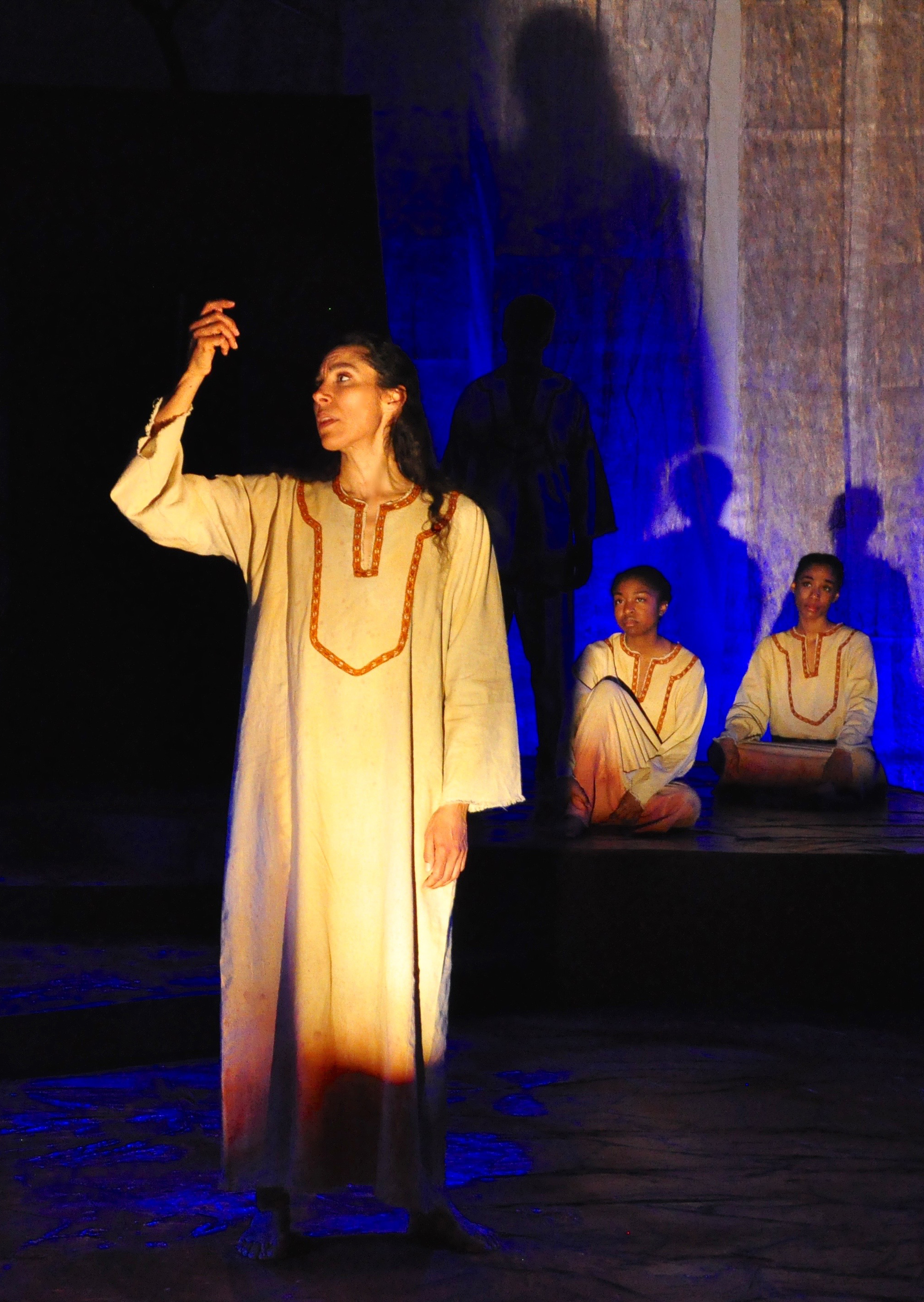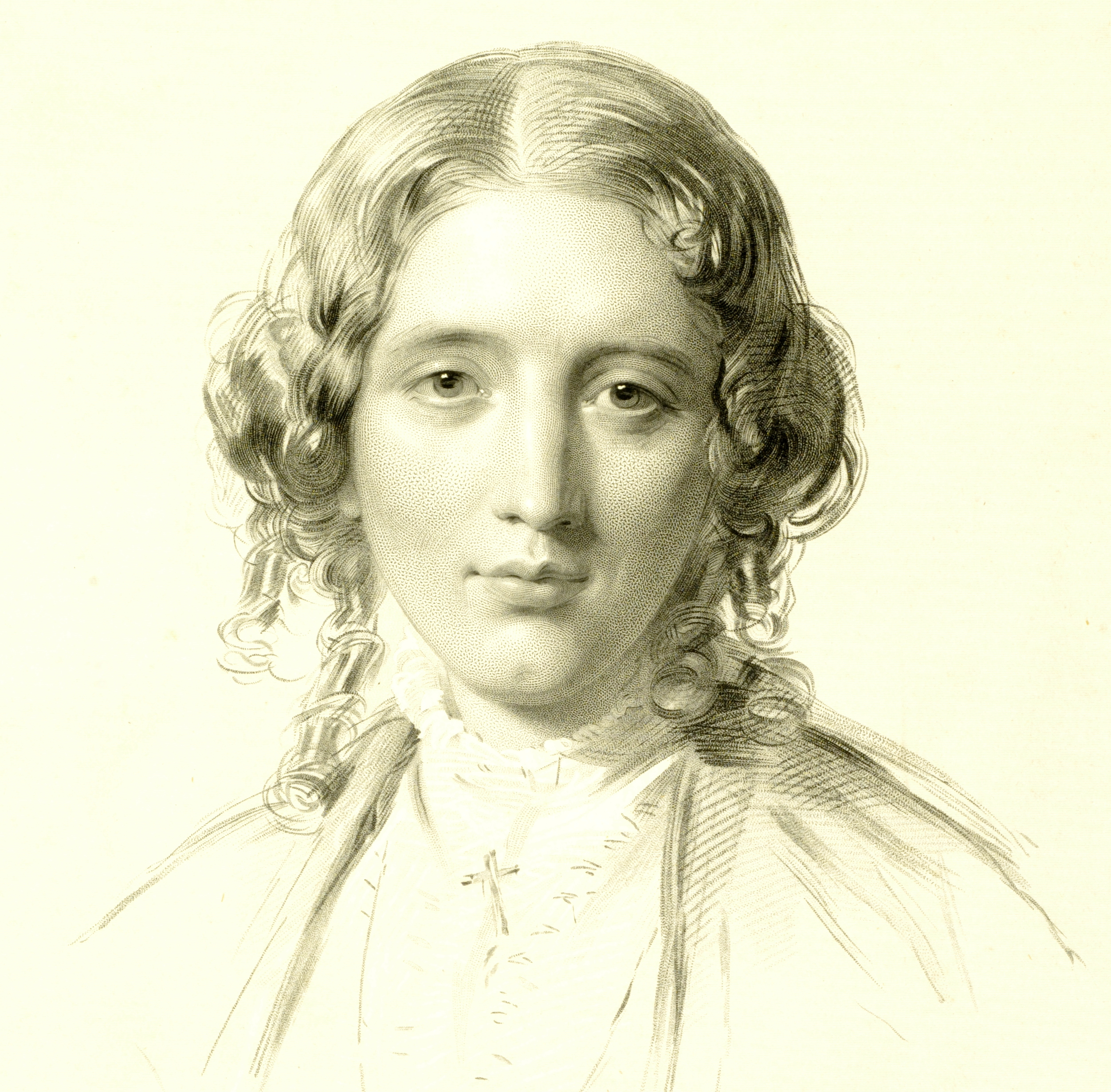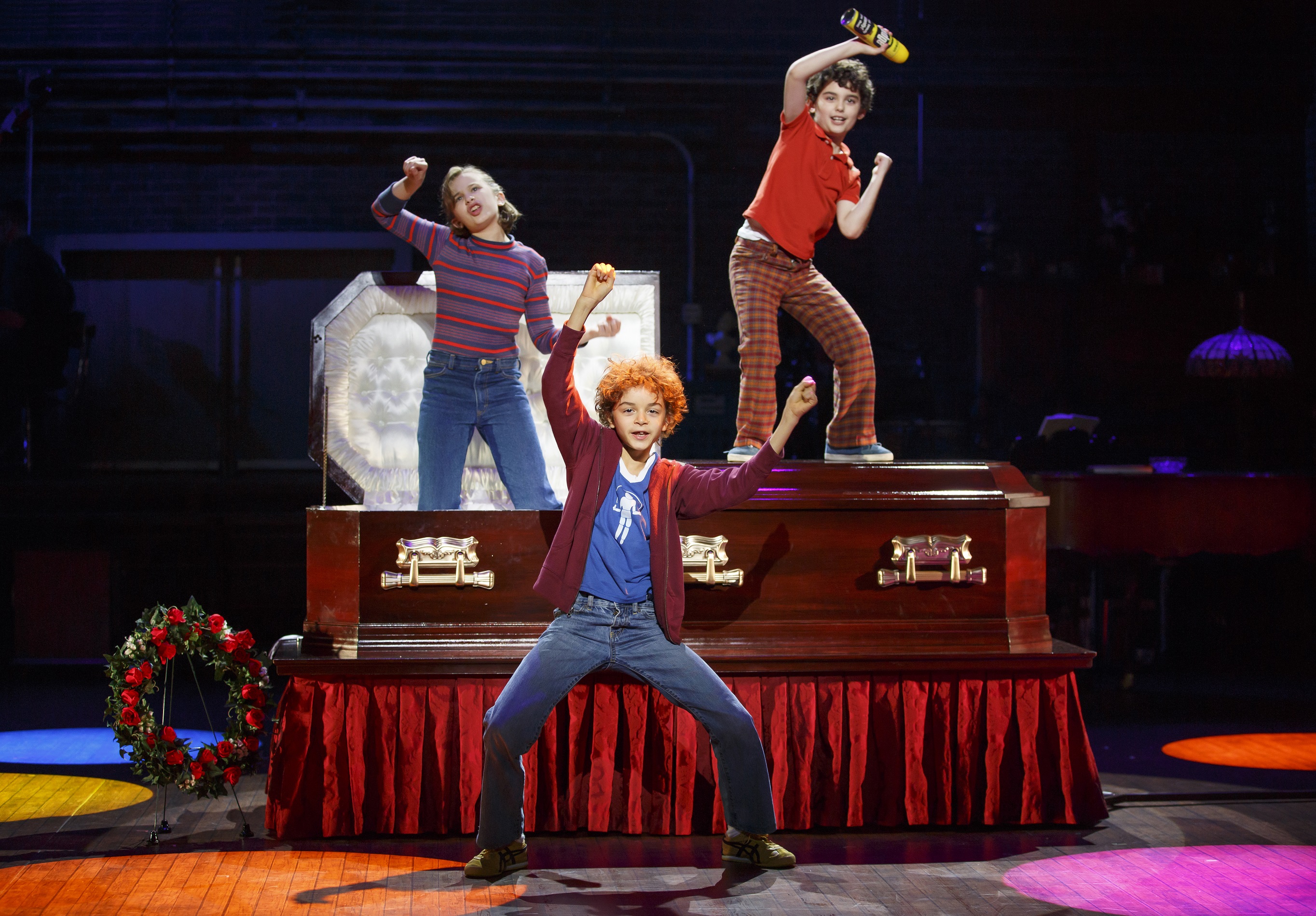April Theater Guide: History on Parade
- Like
- Digg
- Del
- Tumblr
- VKontakte
- Buffer
- Love This
- Odnoklassniki
- Meneame
- Blogger
- Amazon
- Yahoo Mail
- Gmail
- AOL
- Newsvine
- HackerNews
- Evernote
- MySpace
- Mail.ru
- Viadeo
- Line
- Comments
- Yummly
- SMS
- Viber
- Telegram
- Subscribe
- Skype
- Facebook Messenger
- Kakao
- LiveJournal
- Yammer
- Edgar
- Fintel
- Mix
- Instapaper
- Copy Link

Bulgakov (Anthony Bingham, L) and Stalin (Martin Giles) engage in spirited dialectics while Bulgakov’s wife Yelena (Dana Hardy) tries to sleep it off in ‘Collaborators.’
Why are so many plays, musicals, and operas drawn from history? Because there’s an awful lot of it. Everything that has happened is history. Every play, book, folk tale, and tall tale ever made up is history, too, even if it didn’t really happen, and all of that stuff is equally fair game for being turned into something new.
Pittsburgh’s live theater schedule for April includes an exemplary assortment of shows that tinker with various forms of history in various ways. Collaborators is a dark-comic fantasy about an imagined encounter between Joseph Stalin and one of the esteemed writers who lived under his thumb. Uncle Tom’s Cabin or The Most Popular American Play You’ve Never Seen is a re-interpretation of a long-running play that was adapted from Harriet Beecher Stowe’s anti-slavery novel.
The King and I, one of the major touring musicals to visit town this month, is a fictional treatment of a real-life situation in the court of the King of Siam during the 1800s. (And, in a weird bit of synchronicity, a famous scene involves members of the court staging their own version of Uncle Tom’s Cabin.) The other major touring musical is Fun Home, adapted from Alison Bechdel’s gripping true personal history.
And Pittsburgh Opera brackets the month with a pair of historically derived operas. First up is Turandot, drawn from an ancient folk tale of the type in which the hero must answer three riddles. Then later comes the world premiere of The Summer King—an opera based on the life and times of Negro Leagues baseball legend Josh Gibson.
Other notable plays range from Sarah Kane’s astounding but seldom-seen 4:48 Psychosis to Arthur Miller’s classic Death of a Salesman. Shows are previewed below in order of their run dates.
THE GUARD by Jessica Dickey. Now through April 2, City Theatre.
The title character in Jessica Dickey’s play The Guard is a museum guard—the kind who patrols galleries and shoos you back behind the no-step line if you get too close to the art. But rules are made to be broken. In this story the guard and his sidekick, a young new guard, strike up a friendly chat with an art student. They allow and even encourage her to touch the canvas of a 17th-century masterpiece. And when she does, all three are pulled into the world of the painting: Rembrandt’s Aristotle Contemplating a Bust of Homer. This dream-world blossoms into multiple worlds, as Homer himself makes a dramatic appearance and incidents from Rembrandt’s chaotic personal life are replayed. The Guard explores the interplay of life and art along with themes of love and death and of time and mortality. City Theatre is staging The Guard here as part of its mission to present notable new and recent plays; see our review for more. 1300 Bingham St., South Side.

Prince Calaf (tenor Thiago Arancam) will not be denied in ‘Turandot.’
TURANDOT (opera) by Giacomo Puccini and Franco Alfano. Now through April 2, Pittsburgh Opera.
Turandot was Giacomo Puccini’s last opera, and it is a spectacular but gruesome romance. The story, derived from an old folk tale, concerns a Chinese princess who refuses to marry unless a suitor appears who can answer three riddles—and the guesses don’t come free, as one wrong answer means death. In the opening act, a charming but erroneous young man is dispatched even while the crowd sings a plea for mercy. Naturally a suitor emerges who solves the riddles, but this infuriates the cruel princess, leading to further grim twists before the match is made. Puccini died in 1924 while working on the grand closing sequence of Turandot. Fellow composer Franco Alfano finished the opera, which premiered in Milan two years later. Considered musically brilliant if somewhat heavy-handed dramatically, the work has become an enduring favorite. Pittsburgh Opera performs Turandot at the Benedum Center, 237 7th St., Cultural District.
PITTSBURGH FRINGE (theater and arts festival). March 31 – April 2, multiple locations, North Side.
Carrying on the tradition set by the grandmother of all fringe festivals—the Edinburgh Fringe in Scotland, founded in 1947—the Pittsburgh Fringe returns for its fourth year. This year’s event showcases nearly 40 out-of-the-mainstream works of theater, music, and/or comedy by performers and groups from our region to points far beyond. The shows include One-Man Apocalypse Now (a live re-enactment of the movie, by Philadelphia actor Chris Davis); The Bad Idea Variety Show (from the company Bad Idea Entertainment, whose motto is “Better entertainment through poor life choices”); and The Portable Dorothy Parker, a one-woman show about the writer famed for her ironic wit. Shows are at various times and venues in the North Side. See the Pittsburgh Fringe website for schedules and tickets.

Jocasta (Shammen McCune) is Oedipus’ mother and also his wife.
OEDIPUS REX by Sophocles. Through April 8, PICT Classic Theatre.
Sigmund Freud, while living and working in Vienna, Austria, attended at least one performance of Sophocles’ Oedipus Rex. No doubt his seeing the play affected his formulation of the Oedipus complex theory, a phrase he coined to explain a son’s unconscious sexual desire for his mother. (For girls, he called it an Electra complex.) The term is relatively new, just over 100 years old, while the play dates back 2000 years, proof that this classic Greek tragedy is still ripe for fodder even if we all know the story: Oedipus unknowingly kills his father and marries his mother. Oedipus fails to escape fate and gouges out his eyes in horror of his own hubris. Seeing a production of Oedipus Rex should be mandatory for anyone interested in theater, psychology, tragedy, or irony. Luckily, PICT Classic Theatre is staging it at the Union Project, 801 N. Negley Ave., Highland Park. (CM)
DADDY LONG LEGS (musical) by Paul Gordon and John Caird, from Jean Webster’s novel. Through April 9, Pittsburgh Public Theater.
Pittsburgh Public Theater kicked off its 2016-17 season with a chamber musical, The Fantasticks, and apparently the genre has legs, because now The Public is staging another one. Daddy Long Legs is a two-person show adapted from the coming-of-age novel written in 1912 by Jean Webster. A teenaged girl raised in an orphanage is told that a mysterious benefactor will pay to send her to college—quite a rare privilege for young women of that era—on two conditions. Once per month, she must write a letter to the benefactor describing her progress, and she is never to learn the man’s identity. You can probably imagine what happens in regard to that second proviso. Several movie versions of Daddy Long Legs have been made; the musical premiered in Ventura, Calif., in 2012 and has been a hit off-Broadway and elsewhere. The Public presents it at the O’Reilly Theater, 621 Penn Ave., Cultural District.
PETER AND THE STARCATCHER by Rick Elice, adapted from the novel by Dave Barry and Ridley Pearson. March 30 – April 9, Pitt Theatre Arts.
We are living in an age of fantasy, a time when stories set in imaginary realms dominate the popular arts. Cultural literacy requires knowing the lore of at least 50 such places and institutions, from Westeros and Gotham City to Hogwarts and the Black Pearl. And speaking of the supernatural related to piracy, if you have not been briefed on Peter Pan’s backstory, now is your chance. The University of Pittsburgh Department of Theatre Arts is performing Peter and the Starcatcher. This prequel to J.M. Barrie’s classic tale began as a children’s novel. Co-authors Dave Barry and Ridley Pearson felt the modern world needed to know why Peter can fly but cannot grow up, so away they wrote. The 2004 book became a bestseller, while the stage adaptation has wowed audiences from Broadway to Boise. Peter and the Starcatcher picks up young Peter as an orphan sold into servitude aboard a rickety old ship called the Never Land. (That’s two words, with a double meaning—got it?) The Never Land is carrying magical cargo coveted by pirates, which leads to surreal adventures and swashbuckling silliness. Song-and-dance numbers include a vaudeville routine performed by mermaids. In the Charity Randall Theatre at the Stephen Foster Memorial, 4301 Forbes Ave., Oakland.

Anna and the King, one of the famed odd couples in musical theater, are back.
THE KING AND I (musical) by Richard Rodgers and Oscar Hammerstein II. April 4-9, touring company at Benedum Center
Rodgers and Hammerstein’s 1951 musical The King and I is a Broadway legend, a perennial crowd-pleaser, and perhaps the only hit musical to have been banned in the country in which it was set. For the Thais, the main issue was the show’s portrayal of the king. The historical King Mongkut, who ruled Siam (now Thailand) from 1851-68, was a progressive monarch who indeed hired an Englishwoman, Anna Leonowens, as a teacher for his children. But he was by all accounts a far more sophisticated, less imperious man than his depiction in the musical would suggest. It’s hard to blame Rodgers and Hammerstein—they were cajoled into writing the show as a star vehicle for the aging diva Gertrude Lawrence; they had only Western sources to draw from; and they actually gave the king a more sympathetic treatment than those sources did. But above all, the composers came up with a compelling script and beautiful musical numbers, including “Hello, Young Lovers,” “Getting to Know You,” and more. The current touring production of The King and I follows the 2015 Tony Award-winning Broadway revival. See it at Benedum Center, 237 7th St., Cultural District.
LIGHTS OUT by Steve Hallock. April 1–15, Pittsburgh Playwrights.
As the second in its spring series of new plays by local writers, Pittsburgh Playwrights presents Steve Hallock’s Lights Out. The situation is a power failure that stalls a streetcar in the trolley tunnel beneath Mt. Washington. It’s late at night; the car is filled with people who heretofore have been strangers; and many strange exchanges and adventures ensue. 937 Liberty Ave., Cultural District.

Harriet Beecher Stowe, posed here for her author’s portrait, wrote the book read ’round the world.
UNCLE TOM’S CABIN OR THE MOST POPULAR AMERICAN PLAY YOU’VE NEVER SEEN by Tomé Cousin and Jason Jacobs, adapted from George Aiken’s play and Harriet Beecher Stowe’s novel. April 7-16, Point Park Conservatory Theatre.
Harriet Beecher Stowe’s 1852 anti-slavery novel Uncle Tom’s Cabin is widely agreed to have been the global bestselling novel of the 1800s. Along with vigorous domestic sales, it sold over a million copies in England and was translated into dozens of languages and read worldwide. What’s less known is that here in the United States, vastly more people saw the story performed on stage than read it. Knockoffs called “Tom shows,” some of them quite crude, proliferated quickly. But a relatively faithful adaptation by the dramatist George Aiken had a long run on Broadway, then remained in the repertoire of U.S. companies into the early 1900s—thus becoming the most popular American stage play of that entire span. Now Pittsburgh theater artist Tomé Cousin and New Yorker Jason Jacobs bring us a new version. They’ve combined elements of the Aiken script with a re-reading of Stowe’s original, adding modern social and historical perspectives of their own, to produce Uncle Tom’s Cabin or The Most Popular American Play You’ve Never Seen. Point Park Conservatory Theatre is presenting this new take on a long-controversial classic in the Rauh Theatre at Pittsburgh Playhouse, 222 Craft Ave., Oakland.
COLLABORATORS by John Hodge. April 6-30, Quantum Theatre.
British dramatist John Hodge is best known as the screenwriter for the Danny Boyle films Trainspotting and its new sequel T2 Trainspotting. But Hodge can also write a mean stage play. His 2011 entry Collaborators won the Laurence Olivier Award for Best New Play—England’s equivalent of the Best-Play Tony Award—and Quantum Theatre is presenting Collaborators here. Set in Stalin’s Russia during 1938-40, the story is a wild fictional imagining of a real dilemma faced by the Soviet writer Mikhail Bulgakov, who was a striking character in his own right. Bulgakov lived on a knife-edge, admired for his bizarre satirical humor but suppressed as a dissident intellectual. The personal favor of Stalin (who had loved some of his early work) helped to keep the writer alive but did not extend to letting him publish what he wanted. In Collaborators, the secret police make him an offer he can’t refuse: to write a cheesy propaganda play glorifying Stalin. When Bulgakov struggles with the job, the dictator himself offers to help—and the rest is alternative history. At 6500 Hamilton Ave. behind Bakery Square, East Liberty.
WILD WITH HAPPY by Colman Domingo. April 8 – May 13, City Theatre.
Wild With Happy sounds like a title in which the words don’t quite go together but that’s okay, because the play—by actor/playwright Colman Domingo—is a dark comedy about a middle-aged guy with a life that’s like a drawer full of socks that don’t match. The central character, Gil, has pretty much flubbed his career as an actor while losing his boyfriend as well. When his mother dies, he fails to give her a proper burial—but does take a shine to the sexy funeral-home director—and winds up cremating mum and carrying her ashes with him to the only place a fellow can go when times are tough, namely, Disney World. There’s more but perhaps you get the picture. Wild With Happy premiered off-Broadway in 2012; City Theatre is presenting it here. 1300 Bingham St., South Side.

Many children may have wished they could do this but the kids in ‘Fun Home’ get to do it on stage.
FUN HOME (musical) by Jeanine Tesori and Lisa Kron, from Alison Bechdel’s memoir. April 11-16, touring company at Heinz Hall.
As you know if you have read Alison Bechdel’s graphic-book memoir or seen her interviewed on TV, Fun Home is about growing up in a home that was emotionally hectic and often not so much fun. The true story traces the author’s eventual coming out as a lesbian. It reflects deeply on her relationship with an idiosyncratic dad, who—until his untimely death (possibly a suicide)—led a troubled parallel life as a closeted gay man. Praised as a moving personal saga, Fun Home was adapted for the stage and won the 2015 Tony Award for Best Musical. The touring production is in town for eight performances, including two on Easter Sunday, and there’s a reason for the generous booking. The show is one of the hottest tickets of the year, so reserve early. Heinz Hall, 600 Penn Ave., Cultural District.
DEATH OF A SALESMAN by Arthur Miller. April 20 – May 21, Pittsburgh Public Theater.
Arthur Miller’s Death of a Salesman is a tragic play that’s been hailed as one of the 20th century’s greatest. The aging salesman of the title, Willy Loman, has lost his job despite the post-World-War-II economic boom while his two once-promising sons, nicknamed Biff and Happy, aren’t getting along well in life either. There’s a lot of back and forth about what went wrong for whom, and, as the title forebodes, Willy dies. This may sound like a downer all around but it is perceived as a classic dissection of the nature and failings of the postwar American Dream. Death of a Salesman won the 1949 Pulitzer Prize for Drama and Tony Award for Best Play. Pittsburgh Public Theater is staging it at the O’Reilly Theater, 621 Penn Ave., Cultural District.
ROMEO AND JULIET (ballet) by Derek Deane (with music by Sergei Prokofiev.) April 21-23, Pittsburgh Ballet Theatre.
Pittsburgh Ballet Theatre closes its 2016-17 season with a 20th-century classic adapted from a Shakespeare play, Romeo and Juliet. The ballet, which premiered in its present form in Leningrad (now St. Petersburg) in 1940, was significant in the evolution of Russian ballet. It was one of the works that marked a movement toward more dramatically grounded, story-based ballets as distinct from those composed mainly as a vehicle for dazzling dance. The music is by Sergei Prokofiev and Romeo and Juliet has had many choreographers over the years. PBT is dancing a version by British choreographer Derek Deane. Expect swordfights. Benedum Center, 237 7th St., Cultural District.
4.48 PSYCHOSIS by Sarah Kane. April 21 – May 6, off the WALL Productions.
Sarah Kane’s 4.48 Psychosis is not for theatergoers with delicate sensitivities. Kane, a brilliant but troubled English playwright, committed suicide in 1999 at the age of 28. She finished writing 4.48 Psychosis shortly before that. The play is lucid but non-linear; it has been called brutal but eloquent, and whether it conveys an “understanding” of depressive psychosis is a moot question—it certainly conveys the essence of one woman’s struggles. Kane was considered a leading artist of the British movement known as In-Yer-Face theater, and this play fits the category. Due to the disturbing and demanding nature of 4:48 Psychosis, professional performances are relatively rare. Off the WALL Productions does us a favor by producing the play here. Director Robyne Parrish has put together a unique staging which includes original music by Reni Monteverde and choreography by Ella Moriah Mason. At Carnegie Stage, 25 W. Main St., Carnegie.
BJM DANSE (modern dance). April 22 only, presented by Pittsburgh Dance Council.
Pittsburgh Dance Council brings another top-flight modern dance company to town with a visit from Montreal’s BJM Danse. Originally known as Les Ballets Jazz de Montreal, the company shifted to the abbreviated and more cross-lingual name as part of an ongoing quest to remain global and progressive. In Pittsburgh the dancers will perform an evening of three works including “Mono Lisa” (billed as “an acrobatic duet”) plus two ensemble pieces, which promise to be equally high-energy. Byham Theater, 101 6th St., Cultural District.
THE SUMMER KING (opera) by Daniel Sonenberg and Daniel Nester. April 29- May 7, Pittsburgh Opera.
Pittsburgh Opera is staging the first world premiere in its 78-year history, and it is an opera about one of the city’s legendary baseball stars. The Summer King is based on the life of Josh Gibson, who during the 1930s and ‘40s played for both of the area’s prominent Negro Leagues teams, the Homestead Grays and the Pittsburgh Crawfords. Gibson, a catcher and prodigious hitter, is now enshrined in the Baseball Hall of Fame and is rated one the game’s greatest players ever. He also had a tumultuous and ultimately tragic life: he traveled out of the country at times to play in Mexico and the Caribbean; hoped to break baseball’s color line by being invited to join a Major League team (but was not); and died young—of a stroke, at age 35—in 1947, the year Jackie Robinson broke the color line with the Brooklyn Dodgers. Portland, Maine-based composer Daniel Sonenberg, an avid baseball fan, has collaborated with librettist Daniel Nester to write The Summer King. It’s an opera of epic scope that sets out to capture the drama and discord of Gibson’s times as well as the high and low points of his star-crossed career. Benedum Center, 237 7th St., Cultural District.
PUMP BOYS & DINETTES (musical) by the group of the same name. Through April 30, Pittsburgh CLO Cabaret.
Return with us now to those long-ago days of the early 1980s when V-8 Pontiacs prowled the roads, when a Macintosh was an apple you ate, and when country music and small-town characters were still amusing novelties to us sophisticated Northern urbanites. It was during those days, in the unlikely bowels of New York City, that a cabaret musical titled Pump Boys and Dinettes was born. The plot? Shucks, who needs one? This is a singin’, pickin’, and stompin’ revue-type show with several sketch-comedy bits worked in. And the composers? Why, a bunch of nightclub performers called none other than Pump Boys and Dinettes. The setting is somewhere down in North Carolina where a gas station and diner sit side-by-side. And wouldn’t you know, Pump Boys and Dinettes took off so well that the show made it to Broadway … and then across the ocean to London … and it remains in the repertoire today. The living evidence awaits at CLO Cabaret, 655 Penn Ave., Cultural District.
Photo credits: Collaborators, by Heather Mull. Turandot, David Bachman Photography. Oedipus Rex, by Suellen Fitzsimmons. The King and I, by Matthew Murphy. Harriet Beecher Stowe, portrait (1853) by Francis Holl. Fun Home, by Joan Marcus.
Share on Social Media
- Like
- Digg
- Del
- Tumblr
- VKontakte
- Buffer
- Love This
- Odnoklassniki
- Meneame
- Blogger
- Amazon
- Yahoo Mail
- Gmail
- AOL
- Newsvine
- HackerNews
- Evernote
- MySpace
- Mail.ru
- Viadeo
- Line
- Comments
- Yummly
- SMS
- Viber
- Telegram
- Subscribe
- Skype
- Facebook Messenger
- Kakao
- LiveJournal
- Yammer
- Edgar
- Fintel
- Mix
- Instapaper
- Copy Link
Follow Entertainment Central
Sign up for the EC Newsletter
Latest Stories







